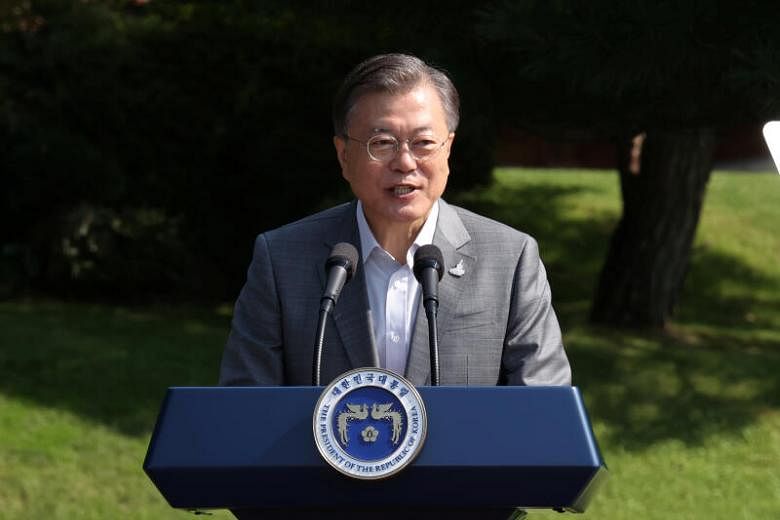South Korean President Moon Jae-in has vowed to make his country carbon-neutral by 2050, in line with recent pledges by major economies including China and Japan to fight against climate change.
"Together with global communities, the government will actively tackle climate change, and move towards the goal of carbon neutrality by 2050," he said during a budget speech yesterday. "Transitioning from coal to renewable energy, the government will create new markets, industries and jobs."
Already adopted by the European Union, the 2050 goal was first raised in South Korea in March this year as part of the ruling Democratic Party's (DP) green manifesto ahead of elections, which the party won in a landslide.
While Mr Moon announced a Green New Deal in July to invest 114 trillion won (S$137 billion) in green jobs, renewable energy, electric cars and energy-saving buildings, as part of a post-pandemic economic recovery package, he stopped short of backing net-zero emissions.
His endorsement finally came two days after Japanese Prime Minister Yoshihide Suga pledged to cut carbon emissions to net-zero by 2050, and a month after Chinese President Xi Jinping set a 2060 target for carbon neutrality.
Mr Moon's declaration, made amid mounting pressure on South Korea to stop investing in coal power plants overseas, was welcomed by environmentalists, climate-conscious investor groups and the United Nations.
South Korea, the world's seventh-biggest carbon emitter according to the World Bank, has long been labelled a climate villain for being the third-largest coal financier, after China and Japan.
State-owned Korea Electric Power Corporation and conglomerate Samsung's construction arm Samsung C&T were heavily criticised earlier this month for investing in the Vung Ang 2 coal power plant in Vietnam.
Mr Kim Joo-jin, managing director of non-governmental group Solutions for Our Climate, said South Korea is "finally one step closer to aligning itself with the reduction pathway compatible with Paris Agreement goals".
But he pointed out that there is "much to be done to make this declaration actually meaningful", such as enhancing South Korea's 2030 emissions reduction target, making a clear road map to phase out coal by 2030, and ending coal financing.
Fundamental changes in energy policy are also required, such as revision of land and maritime restrictions and major reforms in the outdated power market to increase solar and wind power, added Mr Kim.
DP lawmaker Lee So-young, an environmentalist who drafted the party's green manifesto, said the National Assembly will work towards developing the necessary laws and policies to "facilitate this huge societal transition" to carbon neutrality.
-
60
Number of coal plants in South Korea now generating about 40 per cent of its electricity. Four have been shut down, and six more will be closed by 2022, as the power grid shifts towards renewable energy. By 2034, there will be only 30 coal plants left.
Mr Stephane Dujarric, spokesman for UN Secretary-General Antonio Guterres, said they are looking forward to concrete policy measures by South Korea to realise its 2050 goal.
South Korea now has 60 coal plants generating about 40 per cent of its electricity. Four have been shut down, and six more will be closed by 2022, as the power grid shifts towards renewable energy.
By 2034, South Korea should have only 30 coal plants left.
Mr Moon's 2050 target will be welcomed by investors who increasingly want to deploy funds into markets that are reducing climate risk, said Ms Rebecca Mikula-Wright, executive director of Asia Investor Group on Climate Change.
"The three largest economies in East Asia now have clear commitments to net zero emissions by or near mid-century," she said. "This is a powerful market signal that should help encourage other Asian nations to follow suit and send a strong message to carbon-intensive trade partners further afield that the region is moving to decarbonise."
Separately, Samsung C&T has announced a coal exit plan.
Existing projects, like Vung Ang 2 in Vietnam, will be "gradually withdrawn from depending on their contract status", it said.

